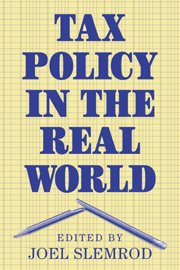Book contents
- Frontmatter
- Contents
- List of contributors
- 1 The real world of tax policy
- 2 Federal tax reform
- 3 Federalism and subfederal taxes
- Threading the fiscal labyrinth: some issues in fiscal decentralization
- A policymaker's guide to fiscal decentralization
- Fiscal decentralization and economic development
- Federalism and reductions in the federal budget
- Issues raised by the new federalism
- Fiscal equalization and school finance
- The case for equalizing aid
- Fiscal equalization: an empty box?
- How would you know a good economic development policy if you tripped over one? Hint: don't just count jobs
- Jobs, productivity, and local economic development: what implications does economic research have for the role of government?
- 4 Principles, politics, and the professors
- Index
Threading the fiscal labyrinth: some issues in fiscal decentralization
Published online by Cambridge University Press: 01 June 2010
- Frontmatter
- Contents
- List of contributors
- 1 The real world of tax policy
- 2 Federal tax reform
- 3 Federalism and subfederal taxes
- Threading the fiscal labyrinth: some issues in fiscal decentralization
- A policymaker's guide to fiscal decentralization
- Fiscal decentralization and economic development
- Federalism and reductions in the federal budget
- Issues raised by the new federalism
- Fiscal equalization and school finance
- The case for equalizing aid
- Fiscal equalization: an empty box?
- How would you know a good economic development policy if you tripped over one? Hint: don't just count jobs
- Jobs, productivity, and local economic development: what implications does economic research have for the role of government?
- 4 Principles, politics, and the professors
- Index
Summary
Abstract - Fiscal decentralization in many guises has become a central concern around the world. This paper discusses several aspects of this complex subject that have turned out to be important in policy work on the issue in a number of countries.
First, I discuss briefly the meaning and rationale of fiscal decentralization. There is much that has to be disentangled before one can approach the issue in a particular policy setting, including distinguishing between the problems of federal finance and fiscal federalism.
Second, I review the issue of the choice of local revenue sources from the perspective of establishing efficient local governments, including the roles of user charges, property taxes, and income taxes. Finally, I sketch some considerations with respect to the design of intergovernmental transfers from the same perspective, with particular emphasis on the desirability in many settings of transfers that are both conditional and equalizing.
INTRODUCTION
In recent years, there has been a worldwide revival of interest in fiscal decentralization. The so-called “countries in transition” of eastern Europe, for example, are busily setting up new systems of local and intergovernmental finance (Bird and Wallich, 1993). Many developing countries are turning to various forms of fiscal decentralization as one way of escaping from the traps of ineffective and inefficient governance, macroeconomic instability, and inadequate economic growth in which so many of them have become mired in recent years.
- Type
- Chapter
- Information
- Tax Policy in the Real World , pp. 141 - 162Publisher: Cambridge University PressPrint publication year: 1999
- 14
- Cited by

